democracynow.org
Stories:

Puerto Rico Debate: Is New U.S. Law Dangerous Increase of Colonialism or Vital Protection from Wall St.?
As Puerto Rico is set to default today on a key debt repayment, President Barack Obama has signed into law the so-called PROMESA bill that puts in place a federally appointed control board with sweeping powers to run Puerto Rico’s economy. The legislation’s supporters say it will help the island cope with its crippling debt crisis by allowing an orderly restructuring of its $72 billion in bond debt, but critics say it is a reversion to old-style colonialism that removes any semblance of democratic control by the people of Puerto Rico over their own affairs. We host a debate between Eric LeCompte, executive director of Jubilee USA Network, which has backed the PROMESA bill, and José La Luz, a longtime labor activist who opposes it. "If we didn’t act by today, the vulture funds were being invited to the party, and Puerto Rico was about to become the next Argentina," says LeCompte. "The truth is that this colonial junta is nothing but a glorified collection agency for the hedge funds and the vulture funds," counters La Luz.
TRANSCRIPT
This is a rush transcript. Copy may not be in its final form.
JUAN GONZÁLEZ: President Barack Obama has signed into law the so-called PROMESA bill, which will establish a federally appointed control board with sweeping powers to run Puerto Rico’s economy. While the legislation’s supporters say it will help the island cope with its historic debt crisis by allowing an orderly restructuring of its $72 billion in bond debt, critics say it’s a reversion to old-style colonialism that removes any democratic control by the people of Puerto Rico over their own affairs. On Thursday, the president signed the legislation as an important first step in helping the island regain financial stability.
PRESIDENT BARACK OBAMA: Through some amazing work by our Treasury Department, our legislative staff and a bipartisan effort in both the House and the Senate, we finally have legislation that at least is going to give Puerto Rico the capacity, the opportunity to get out from under this lingering uncertainty with respect to their debt, to start stabilizing government services and to start growing again. It’s not, in and of itself, going to be sufficient to solve all the problems that Puerto Rico faces, but it is an important first step on the path of creating more stability, better services and greater prosperity over the long term for the people of Puerto Rico.
AMY GOODMAN: Earlier this week, the Senate voted 68 to 30 in favor of the PROMESA bill, just days before Puerto Rico was expected to default on a more than $2 billion debt payment, which it has today. New Jersey Senator Bob Menendez led the opposition to the bill.
SEN. BOB MENENDEZ: It is a vote to authorize an unelected, unchecked and all-powerful control board to determine Puerto Rico’s destiny for a generation or more. It is a bill to force Puerto Rico, without their say, to go $370 million further in debt to pay for this omnipotent control board, which they don’t even want. It is a vote to cut the minimum wage down to $4.25 per hour for young workers in Puerto Rico. It’s a vote to make Puerto Ricans work long overtime hours without fair compensation. It’s a vote to jeopardize collective bargaining agreements. It’s a vote to cut worker benefits and privatize inherently government functions. It’s a vote to close schools and shutter hospitals and cut senior citizens’ pensions to the bone. It’s a vote to put hedge funds ahead of the people. And it’s a vote to sell off and commercialize natural treasures that belong to the people of Puerto Rico.
JUAN GONZÁLEZ: That was Senator Bob Menendez of New Jersey. Democratic presidential candidate and Vermont Senator Bernie Sanders also spoke out against the legislation. Meanwhile, Democratic Senator Dick Durbin of Illinois spoke in favor of the PROMESA bill.
SEN. DICK DURBIN: What’s the alternative if we vote no? And you’ll hear a lot of members saying, "Let’s just vote against this and put an end to it." The alternative, if we vote no, is to give the bondholders, those who are holding the debt of Puerto Rico, all the cards July 1st. All the cards. They can then go to court and force their hand for payment on these debts. And Puerto Rico, which is struggling to provide basic services, will have even more money taken away from them. What is a disaster situation will become disastrously worse if we vote no and do nothing. This oversight board, for all its flaws, has the power to stop that from happening, has the power to enter into voluntary negotiation on the debt of Puerto Rico. And if they can’t reach a voluntary agreement, they have the power to go to court for restructuring on all of the debt that faces that island. Now, that is significant. I hope it doesn’t reach that point; I hope there is a voluntary negotiation. But to say that we are going to protest the creation of this board, by voting against the creation of the board and this outcome that I’ve described, is to throw this poor island and the people who live there into chaos.
AMY GOODMAN: That’s Senator Dick Durbin. Also this week, in Puerto Rico, demonstrators in opposition to the PROMESA bill have established an ongoing protest camp outside the U.S. Federal Court in the capital city of San Juan.
Well, for more, we host a debate. In Washington, D.C., we’re joined by Eric LeCompte, the executive director of Jubilee USA Network, which has backed the PROMESA bill. And here in New York, we’re joined by longtime labor activist José La Luz, who’s an opponent. He organizes, promotes and advocates for worker rights in Puerto Rico and the United States. La Luz has retired from the American Federation of State, County and Municipal Employees, or AFSCME, and now works as an adviser to the AFSCME affiliate Civil Service Employees Association.
We welcome you both to Democracy Now! Well, the bill passed, so, Eric LeCompte, your thoughts today?
ERIC LECOMPTE: Well, essentially, the legislation is incredibly important. There can be no economic growth in Puerto Rico before the debt is restructured. Unfortunately, without this legislation, Puerto Rico had no protections to pay pensions, to pay teachers and to pay social services. So it’s incredibly important.
I know your listeners are very aware of the Argentina situation and what happened when a group of vulture funds essentially held that South American country hostage for nearly 16 years. Puerto Rico was about to become the next Argentina. The same types of vulture funds today, if the legislation did not pass, would have swooped in, bought the debt, for pennies on the dollar, and held Puerto Rico hostage. Where Argentina was, is a relatively wealthy country, as it caucuses with the G20, we’re talking about an island, Puerto Rico, where 60 percent of the people live—of the children live in poverty, where 45 percent of the people live in poverty. The rates are just staggering. They’re unbelievable. And what happened with this legislation passing is the vulture funds were told they’re not allowed to come to the party. So we prevented Puerto Rico from becoming the next Argentina. This is absolutely crucial to understand.
It’s also absolutely crucial to understand that because the president signed this legislation yesterday, last night the governor of Puerto Rico was able to declare a debt moratorium and announce that the pensions that have been being taken from for years to pay the debt are now going to be able to pay back, that social services are going to be paid on the island, that there’s going to be protections for children and reducing poverty. So, even though there are concerns with the legislation and we’ve worked in the legislative process and been able to address many of these concerns, we haven’t been able to address all of them. But we knew that there was no alternative, and if we didn’t act by today, the vulture funds were being invited to the party, and Puerto Rico was about to become the next Argentina.
JUAN GONZÁLEZ: José La Luz, what about that? Your thoughts, and this issue of whether the vulture funds have been stayed by the legislation passed by the Senate?
JOSÉ LA LUZ: The truth is that this colonial junta is nothing but a glorified collection agency for the hedge funds and the vulture funds. In fact, everything that Eric explains is precisely the reason why this is such a bad piece of legislation. There is absolutely no protections, no provisions to protect pensions, collective bargaining rights, worker rights. There will be a sub-minimum wage. But the most serious consequence of this is that this takes us back to the days immediately after the U.S. military occupation of the island, before the Foraker Act. This is a very, very serious, very seriously flawed piece of legislation.
We are deeply disappointed that Jubilee USA, a Catholic organization, which has been known consistently for its defense of, you know, working families in other parts of the world, has taken such a position. We suspect it may have something to do with the relationship that Mr. LeCompte himself has with the archbishop of San Juan, Roberto González, who terminated the pensions of the Catholic schools’ employees unilaterally, who shut down Catholic schools. So, this is in fact something that paves the way for a feast, for a field day for the hedge funds and Wall Street. And it has serious and grave consequences, because now we will witness a sustained, consistent and escalating resistance of people in Puerto Rico, which will have serious consequences in terms of the relationship with the United States. I think that Mr. LeCompte must realize that his organization has made a very serious, serious mistake in supporting this piece of legislation.
AMY GOODMAN: Eric LeCompte, your response?
ERIC LECOMPTE: Well, I agree with some of the concerns that José raises. I don’t think he understands the legislation. I don’t believe that he’s read the legislation. I think that we’ve seen a lot of compromises to address the particular issues he’s raising, but we have to understand—we do work with the religious leaders in Puerto Rico, and we do believe the religious leaders—the Catholic Church in Puerto Rico, the Pentecostal leaders, the evangelical leaders, the head of the Bible Society—have been the real hero in this. For the last year, they have been the most outspoken group about the effects of the debt crisis, the growing tragedy where nearly 60 percent of kids live in poverty. When we talk about a liquidity crisis, when we talk about legislation not passing today, that means a lot more than the choices that teachers are making in Puerto Rico about whether or not to turn on the computers today or whether or not to turn on the lights today. It means more than law enforcement getting cut. It means more than healthcare getting cut in the face of the Zika virus. We have to understand that right now in Puerto Rico, for the past few months, at the central hospital, sick kids at the only newborn, neonatal special care unit have not been able to get direct access to dialysis. They haven’t been able to get access life-saving drugs. Kids in the center there can’t get access to chemotherapy drugs, because they don’t have credit. They can only do cash on demand. And as limited as the credit crunch was becoming already on the island, if the legislation didn’t pass, we were going to see things even become more worse.
Now, with the archbishop of Puerto Rico, who’s been very outspoken about the legislation and concerns about the legislation, who worked on both sides of the aisle, with representatives like Nydia Velázquez and José Serrano, who came to bat on this legislation, we know that they have had the best interests of their people at the heart of this. They have been the ones most outspoken about the crisis, and we’ve worked with them closely for a year, working on every possible solution. And our work doesn’t end today. There’s still a lot more work to do. But we’ve worked on solutions at the Federal Reserve, the U.S. Treasury, the White House, and then put pressure on Congress to act. I think it’s really important that we need to understand what Archbishop Roberto González, the Catholic Bishops Conference and the religious leaders said in Puerto Rico. The legislation has to pass in order to stop the humanitarian crisis. It has to pass and move forward in order to reduce child poverty. At the same time, they reminded all of us that the problems in Puerto Rico and this current crisis is a direct result of the island’s colonial status. And in order to stave off the next crisis, we have to address the colonial status on the island. But we have to also understand that without passing this legislation, the vulture funds would have swooped in. Without passing this particular legislation, there would have been no protections to pay pensions, to pay teachers, to pay firefighters. Essentially, what we would have had in Puerto Rico was a great invitation for the vulture funds. In terms of, I think, some of the concerns that we have—
AMY GOODMAN: I’m going to interrupt for a minute, because we have to break. But when we come back, we’ll also, of course, get response from labor activist José La Luz. Eric LeCompte is executive director of Jubilee USA Network. We’re talking about the passage of the PROMESA bill that President Obama has signed off on, today Puerto Rico defaulting on its $2 billion debt repayment. We’ll be back in a minute.
[break]
AMY GOODMAN: "Tiburón," "Shark," here on Democracy Now!, Rubén Blades and Willie Colón. This is Democracy Now!, democracynow.org, The War and Peace Report. I’m Amy Goodman, with Juan González. Our guests are Eric LeCompte, executive director of Jubilee USA, and labor activist José La Luz, joining us in New York. Juan?
JUAN GONZÁLEZ: Yeah, I wanted to ask José also, taking over from what Eric LeCompte just said, this whole issue of the chaos that would have resulted, supposedly, if this bill had not been passed—Maria Cantwell, in her debate, in her remarks on the Senate floor, as well as Bob Menendez, said number one is, you’re deluding yourself if you think there’s not going to be legal challenges. The bondholders and the vulture funds are not just going to sit back. They’re going to challenge the constitutionality of this law, and there seem to be significant grounds. For instance, a Congressional Budget Office report even questions what kind of an agency this is. The legislation says it is created by Congress as an agency of the Puerto Rican government. The Congressional Budget Office says, no, this is an agency of the federal government, not of the Puerto Rican government. There’s a host of issues that the bondholders are going to challenge anyway. The only difference is, at this stage, as, Eric, you mentioned, that the governor has put a moratorium on the debt and will now be able to make regular—regular expenses of the Puerto Rican government. But as soon as the control board comes into power, he’s not going to have any more power; the control board will determine everything. So this could be virtually the last act of the current governor of Puerto Rico, this moratorium that he did today. So I wanted to ask José, what about this whole issue of this law had to be passed before July 1, or there would be chaos in Puerto Rico?
JOSÉ LA LUZ: As recently as last night, the president of the Senate, Eduardo Bhatia, indicated that there will be, in fact, litigation occurring, precisely because of the very reasons you pointed out to. Senator Orrin Hatch has requested an investigation by the Securities and Exchange Commission about the role of Treasury Secretary Lew. There are many questions that are unanswered here. A citizens inquiry commission discovered in its findings that as much as $30 billion of the debt may be illegal, because it exceeded the ceiling provided by the Constitution of the Commonwealth. So there are many, many questions. But one of the fundamental things here is that there is no guarantee that in fact there will be restructuring. It requires a supermajority of five, and four of the seven will in fact be right-wing Republicans, whose main interest, undoubtedly, will be that the creditors get paid. These are their friends in Wall Street and in the hedge funds. So I don’t see what legislation Eric is referring to.
I find this repugnant, Eric, essentially coming from an organization that has distinguished itself for being an advocate for the poor around the world. And colonialism is repugnant in all of its forms and manifestations. You, my friend, will have blood on your hands if this results in the kind of unrest that we witnessed in the 1970s, because I will tell you with very certainty that the people in Puerto Rico, once they discover the serious implications of this, will not tolerate it. And this imposes only harsher austerity measures on the Puerto Rican people of the situation that is already very bad. This is, in fact, a classic case study in what Naomi Klein calls the shock doctrine. The economic hit men started operating in Puerto Rico from the vulture funds since the moment that Puerto Rico inexplicably was removed from bankruptcy protection in 1984, and then the government kept borrowing. Puerto Rico had no tools for economic development. This bill contains no measures to restore economic growth and development, none whatsoever. Yet Senator Sanders offered a legislation that addressed the question of economic growth and economic development, something similar to what FDR did in the 1940s, with Eleanor Roosevelt and Rex Tugwell’s support, that created a Puerto Rico Economic Reconstruction Administration. Nothing of that sort exists in this legislation. It’s all about austerity, harsh austerity measures that will affect the most vulnerable in Puerto Rico.
JUAN GONZÁLEZ: Eric LeCompte?
ERIC LECOMPTE: When you read the legislation, you realize that there are some amazing and powerful anti-austerity measures that have been placed in the legislation, including what we have been able to amend to the legislation so that any economic growth plan, any recommendations, must take into account reducing child poverty on the island. This is incredibly important. Also with the legislation, we were able to protect the work of the debt audit committee, that’s led by labor partners on the island, the Chamber of Commerce. But to find out where the debt comes from, what are the questions about the debt, is the debt legitimate or not, that’s going to go forward because of this legislation. We have to understand that’s really important. I think one of the great concerns that the religious leaders have had on the island, and we’ve certainly expressed in every debt restructuring plan we’ve worked on around the world for the last 20 years, is that, going forward, there needs to be greater public budget transparency. The debt audit commission is key to this.
But we also agree that the oversight board is not the actual answer for this. There’s no way to talk about the oversight board in Puerto Rico without talking about Puerto Rico’s colonial status. And it’s also true the religious leaders acknowledge that reality and are very saddened by that. But they knew that, going forward, passing this legislation, in order to get votes on both sides of the aisle, had to do this. Now, with acknowledging the oversight commission’s status and the issues of colonialism on the island, I think it’s really important to understand what the legislation actually says about the oversight commission. Even though we don’t believe it’s an efficient way to install public budget transparency, this is not like the control board we had in D.C., in New York, or we still have in Detroit. This particular oversight commission is in addition to the political process. It doesn’t circumvent the governor. It doesn’t circumvent the legislative process. It does add an additional approval and monitoring process to the budget. But with that said, I mean, we very much understand the concerns about any kind of oversight commission. That’s why we’ve supported the public budget transparency initiatives of the debt audit. It’s why we believe there needs to be legislation that passes in the Legislature in Puerto Rico to have a higher degree of accountability.
But I think, most importantly, what we really need to understand is that these are some of the best and most powerful debt restructuring tools we’ve ever seen passed by the U.S. Congress. In fact, some of the provisions, whether negotiations are done in a voluntary way or whether they’re forced, this is even better than Chapter 9 or Chapter 11 in the United States, because it forces all sides of the problem to come together for negotiation and to come with a negotiated solution. It also forces—
JUAN GONZÁLEZ: But, Eric, if I—
ERIC LECOMPTE: —any vulture funds that may exist not to be at the table, because three-quarters of all creditors, when they agree to a solution, it binds all the creditors.
JUAN GONZÁLEZ: But, Eric—
ERIC LECOMPTE: So it’s incredibly powerful, these tools.
JUAN GONZÁLEZ: —if I could interrupt you for a second. When you talk about the voluntary negotiations, these are voluntary negotiations not between the people of Puerto Rico and the bondholders. These are voluntary negotiations between the control board, six of whose seven people don’t even have to live in Puerto Rico, and the bondholders. So these are voluntary negotiations between two entities that are not part of the Puerto Rican nation, or, I mean, so just calling it—
ERIC LECOMPTE: No, that’s not how the legislation actually reads. I mean, just to clarify—and certainly understand what you’re saying—but in terms of how the legislation actually operates, when we talk about voluntary negotiations, that’s between the government of Puerto Rico and that’s the creditors. Now, if a voluntary negotiation happens—and this is significant, because all the bondholders are going to be forced into these negotiations—a final plan does need to be approved by the control board, but they’re not the ones that are actually negotiating it. The legislation, in its outset, has strong protections for pensions. It has strong protections for social services. And it also notes that in any negotiation we can’t see these types of services cut.
JUAN GONZÁLEZ: José?
JOSÉ LA LUZ: The entire labor movement—Eric, I don’t know what planet you’re living in. From the AFL-CIO, SEIU, AFSCME, the United Food and Commercial Workers, all of the unions here in the U.S. and in Puerto Rico rejected this—rejected this. So I don’t know what legislation you are referring to. All of the social advocacy organizations, except your friend the bishop, the one that terminated the pensions for the school employees, accepted this. And I want you to understand something very clearly. You, you, my friend, will be held accountable to the Puerto Rican people. And I can say—I can say that no Puerto Rican that agrees to serve on this board ought to feel safe. I can say that, because the rage that the Puerto Rican people will express as they discover the consequences of this legislation is such that you have no idea of what—of what this will turn into. And I tell you one thing: I find that repugnant, repugnant, that Jubilee USA, which is an organization associated with a pope that we admire because of his defense of the poor and working families, has taken this position in what is now the Greece of the United States. This is the Greece of the United States. And you now are responsible, as much as any of your friends that supported this legislation. I am really, really sorry that your organization endorsed this thing, Eric, really sorry.
AMY GOODMAN: How do you account for Congressmembers Nydia Velázquez and José Serrano, José, who are both Puerto Rican-born? How do you account for their support for this?
JOSÉ LA LUZ: Well, I tell you Luis Gutiérrez was adamantly opposed to this, because it has no safeguards for pensions, no protections for pensions whatsoever. I don’t know what law Eric is reading here. That’s why the entire labor movement rejected this thing. And Luis Gutiérrez was very emphatic. This is repugnant because it’s colonialism. It’s raw and crude colonialism. And when you speak of colonialism in this day and age, this is an invitation. This is an invitation for people to take any measures, you know, to get rid of colonialism. And so, I think that Nydia and José Serrano will have to answer to the Puerto Rican people in due time. I believe they are good people. They have been consistent supporters of Democratic rights. But on this one, they got it wrong. This junta, this junta, which is nothing than a colonial junta, usurp fundamental democratic rights of the Puerto Rican people. And this is very perverse.
JUAN GONZÁLEZ: Well, let me interrupt. I want to ask Eric about one other aspect of the legislation, which has to do with the critical infrastructure portion, which I don’t understand why it was even in the legislation to begin with. But it basically allows, especially with the electric company, which I’ve always called the crown jewels of Puerto Rico, the Puerto Rico Electric and Power Authority, a government-owned electric company—it seems to pave the way for the privatization and the selling off of the assets of the electric company in an effort to modernize and bring in new investments. And it also, the legislation, as Senator Menendez said, allows all kinds of existing environmental laws and regulations to be waived in the process of expediting the modernization of the electric power generation in Puerto Rico. Do you have any concerns about that aspect of the legislation?
ERIC LECOMPTE: Well, we certainly have concerns that are related. With respect to Senator Menendez, we believe that he was, in his floor debate, actually referring to a much earlier version of the legislation, where it talked about selling off portions of the Vieques wildlife refuge. It was one of the many provisions that we were successful in getting removed in this particular legislation. I think, you know, some of the greater issues, overall, around this, it does have to do with implementation and how the oversight commission moves forward. We do have very specific concerns about the legislation. Where we respectfully disagree with José, that the pensions are respected, number one, to be paid back, and the pensions also have very strong language to protect them in the legislation. Our biggest concerns about the legislation remains that the new overtime protections could be delayed in Puerto Rico, and we do have certain concerns about certain powers that the oversight commission has. I mean, with that said, I think what we do understand from this legislation, that right away this has stopped Puerto Rico from becoming the next Argentina. We’ve stopped vulture funds. We’ve essentially created a precedent where we say debt is paid first. We’ve stopped 16 lawsuits against the government of Puerto Rico. And we’ve made sure that vulture funds aren’t coming to the table, and that teachers, firefighters and social services are paid first.
AMY GOODMAN: We’re going to have to leave it there, but of course we’ll continue to follow this. I want to thank Eric LeCompte, executive director of Jubilee USA Network in Washington, and José La Luz, labor activist who organizes, promotes and advocates for worker rights in Puerto Rico and here, overall, in the United States.
This is Democracy Now!, democracynow.org, The War and Peace Report. When we come back, history is made. Two trans candidates win their primaries in their respective states, Utah and Canada, going on to the—and Colorado, going on to the major election in November. And we’ll talk about the Pentagon’s historic decision allowing trans people to openly serve in the U.S. military. Stay with us. ... Read More →

Meet the Two Trans Women Making History as First to Win Major-Party Primary Elections
We speak with two transgender women who made history this week when they won their primary elections in Utah and Colorado to challenge Republican incumbents for U.S. Congress in November, and get their reaction to the Pentagon’s announcement that it will end its ban on openly transgender people serving in the military. "The only thing that should matter is, can you do the job? Nothing else," says 33-year-old military veteran Misty Plowright of Colorado. On Tuesday, she and 30-year-old Misty Snow, of Utah, became two of the nation’s first openly transgender candidates to win a major-party congressional primary in U.S. history. "My trans status didn’t come up" on the campaign trail, Plowright notes. "They were much more focused on issues, my stances."
TRANSCRIPT
This is a rush transcript. Copy may not be in its final form.
JUAN GONZÁLEZ: We turn now to election news. History was made on Tuesday when two transgender women were nominated by Democratic primary voters in Utah and Colorado to challenge Republican incumbents for the U.S. Congress in November. Thirty-year-old Misty Snow of Utah and 33-year-old Misty Plowright of Colorado are two of the nation’s first openly transgender candidates to win a major-party congressional primary in U.S. history.
AMY GOODMAN: Misty Snow was a late entry into the Utah primary race, offering a progressive alternative to conservative Democrat Jonathan Swinton. She beat him in Tuesday’s race with 59.5 percent of the vote to his 40 percent. Snow will now face incumbent tea party Republican Senator Mike Lee in the general election. IT worker Misty Plowright similarly beat out her primary opponent by more than 16 percentage points. She’ll challenge Republican incumbent Congressmember Doug Lamborn in what’s considered one of the most conservative districts in Colorado.
For more, we’re going to go directly to Denver, where Misty Plowright is in studio at Denver Open Media.
Welcome to Democracy Now! Talk about your victory and the significance of this moment, Misty.
MISTY PLOWRIGHT: Thank you very much, and thank you for having me. This primary was very, very cool, very interesting. And, you know, I find it very humbling that in, as you said, what is traditionally thought of as a very conservative district, even among Democrats, would nominate—nominate me for the U.S. House in that district.
JUAN GONZÁLEZ: And how was your candidacy received when you were out on the campaign trail?
MISTY PLOWRIGHT: Out on the campaign trail, people were very receptive. My trans status actually didn’t come up very often at all. And the few times it did, people were just kind of asking questions because they weren’t really sure, you know, what it was. But people didn’t really make an issue of it. They were much more focused on issues, my stances on things. And that’s really how I prefer it to be. I want to campaign on issues, and I’d like to win on issues.
AMY GOODMAN: So, talk about your race and what you think the critical issues are, just outside of Colorado Springs. I mean, we’re talking about one of the most conservative areas in the country.
MISTY PLOWRIGHT: Well, actually, that’s something that I’m not sure that I agree with. Colorado Springs and the area around it is not as conservative as people tend to think that it is. You know, certainly, Focus on the Family and similar organizations get a lot of attention. But realistically, Colorado Springs itself, it’s more libertarian than it is conservative. And, you know, out on the campaign trail, jobs are a big concern, especially—you know, Colorado Springs is the most populous area in this district, but it covers a lot of area outside of Colorado Springs. And, you know, there’s a lot of people struggling in that district. So, it’s—I think that’s one of the biggest concerns for a lot of people.
JUAN GONZÁLEZ: And talk about what inspired you to run. You were a late entrant into the campaign. Why—the process that you went through in deciding to run?
MISTY PLOWRIGHT: Well, this has actually been a very long process. I mean, the answer to, you know, the question is a very long one. But basically it boils down to I couldn’t sit on the sidelines anymore. I had to really get involved at a much different level. I didn’t think I could sit on the sidelines anymore, casting a vote here and there and hoping that something changes. You know, "be the change you want to see in the world" are words I’ve tried to live by for a very long time. And anytime someone has been like, you know, "There’s no way you can win there," it’s like, you know, everything’s impossible until it’s done.
AMY GOODMAN: On Thursday, Defense Secretary Ash Carter announced the Pentagon will end its ban on openly transgender people serving in the military. This is what he said.
DEFENSE SECRETARY ASHTON CARTER: Our mission is to defend this country, and we don’t want barriers unrelated to a person’s qualification to serve preventing us from recruiting or retaining the soldier, sailor, airman or marine who can best accomplish the mission. We have to have access to 100 percent of America’s population for our all-volunteer force to be able to recruit from among them the most highly qualified and to retain them. ... The reality is that we have transgender servicemembers serving in uniform today. And I have a responsibility to them and to their commanders to provide them both with clearer and more consistent guidance than is provided by current policies.
AMY GOODMAN: Under the new rules, the military will provide all healthcare, including surgery, to transgender troops. Many hailed the decision as a step forward in LGBT rights. Victoria Rodríguez-Roldán of the National LGBTQ Task Force said, quote, "This decision is a great victory for the many trans people who have served and sacrificed in the military over the years." But others criticized it, like award-winning writer Mattilda Bernstein Sycamore, who wrote, quote, "How far we have come from the original goals of gay liberation as it emerged in the 1960s and 1970s—an end to the oppressive state, organized religion and the nuclear family—a rejection of war, racism, white supremacy and imperialism," she wrote. Misty, your response, as now a Democratic nominee for Congress, as a trans woman yourself and as a military veteran, Misty Plowright?
MISTY PLOWRIGHT: I think it’s a lot more than just a victory for the LGBT community. I think it’s also an amazing thing for America itself. We keep striving to realize our lofty ideals. And anyone who wants to serve this country and is capable of fulfilling the job of doing so should be allowed to. It shouldn’t matter who you are or—I mean, the only thing that should matter is, can you do the job? Nothing else.
JUAN GONZÁLEZ: Well, you would be considered a longshot candidate against Representative Doug Lamborn. What do you see as his primary weaknesses and what you will hope to gather a majority of the voters around your—how you would gather them around your candidacy?
MISTY PLOWRIGHT: Well, there’s five military installations around Colorado Springs, and Mr. Lamborn is very weak on veterans’ issues. And that’s something that I can really go after him on and I intend to go after him on pretty heavily. He’s also in favor of the TPP. He blasts Obama for it, but then he votes to fast-track it. So, he’s pretty vulnerable on a lot of issues. And it’s just a matter of taking my case to the people and really making it all about the issues and just hammering away on that.
AMY GOODMAN: Misty Plowright, we’re trying to get Misty Snow in studio in Salt Lake City. We’re having a little technical problem. But I wanted to ask you about Bernie Sanders’ campaign, if that inspired you, and about the platform debate that’s now going on, the Democratic platform.
MISTY PLOWRIGHT: Yeah, Bernie Sanders was certainly an inspiration and, you know, definitely a part of what was behind my run. You know, I mean, he’s said from the get-go he can’t do it alone, you know, so that was definitely a part of my decision to run. And the platform, I’m not surprised at all by what the party leadership is doing. I, myself, was actually an unaffiliated until July of last year, and I’m not shy about criticizing the Democratic Party leadership, especially with—you know, like they refuse to put in language against the TPP. And they’ve shot down just about every progressive idea that really drove a lot of things in this election cycle and during the primaries and caucuses. Democrats don’t lose elections because they’re not conservative enough. They lose elections because they’re not the party of the people anymore. The voice of the people has been lost. And that really needs to get brought back to the party. So, it doesn’t surprise me what they’re doing with the platform. But Bernie Sanders is right: They need to wake up, because my generation is—frankly, we’re not going to put up with that kind of crap for very long.
AMY GOODMAN: And your thoughts on Hillary Clinton and the whole the Bernie or Bust movement, and Donald Trump, the—at least at this point, the presumptive Republican nominee?
MISTY PLOWRIGHT: Yeah, Donald Trump is scary. He’s like 1930s Germany scary. He’s scary. I understand the Bernie or Bust movement. I was—I considered myself Bernie or Bust for quite a while. I’m really not sure. I have a lot of deep, deep concerns and issues with Hillary Clinton. I was actually a Hillary supporter in 2008. But her tenure as secretary of state got into a lot of things and destabilized a lot of regions in the world, that really make it hard for me to be able to get behind her. I mean, I certainly don’t want Trump, and I’ve never subscribed to the lesser-of-two-evils thing.
AMY GOODMAN: Misty Plowright—
MISTY PLOWRIGHT: And I’ve never cast a vote—
AMY GOODMAN: We got Misty Snow on the line with us, the Democratic nominee for Senate in Utah—
MISTY PLOWRIGHT: OK.
AMY GOODMAN: —the first openly trans candidate to be nominated for Senate from a major party, won the Democratic primary in Utah on Tuesday. Welcome to Democracy Now!, Misty Snow. Talk about the significance of your win and how you plan to win in November.
MISTY SNOW: Well said. I think it’s a great moment in our country for the LGBT community, especially trans people. I’ve had a lot of people reaching out to me, telling me how much it means to them that I’m running. And someone even told me that they’re—like a trans woman in Texas told me she wants to actually run for House of Representatives in 2018. So I’m making a difference just by running.
And how I’m going to win in November is, you know, my opponent, he has like a 38 percent approval rating right now, and I’m already polling at 37 percent, which is better than Democratic Senate candidates typically do in Utah. And that was before I won the nomination, when I didn’t have as much name recognition as I do now from all the press. And, you know, I think the way to do it is just to try to use this moment, you know, to try to start appealing to people all across the nation, especially like the Sanders supporters, who were able to give Bernie Sanders a competitive campaign with small donations, without corporate funding. And I think, you know, we need to really make the case that, for the revolution to continue, you know, those people, those same donors, need to start donating to congressional candidates all over the country to get progressives elected.
AMY GOODMAN: Misty Snow, we’re going to have to leave it there. I want to thank both of you for joining us. You’ve both made history, Misty Snow in Utah and Misty Plowright in Colorado, the first openly trans women to win their party’s nomination for the race in November.
That does it for the show. Tune in Monday for our July 4th special, when we feature the words of Frederick Douglass and Saul Williams and Jesse Williams. I’m Amy Goodman, with Juan González. Thanks so much for joining us.. ... Read More →
Headlines:Obama Signs PROMESA Bill, Imposing Control Board on Puerto Rico
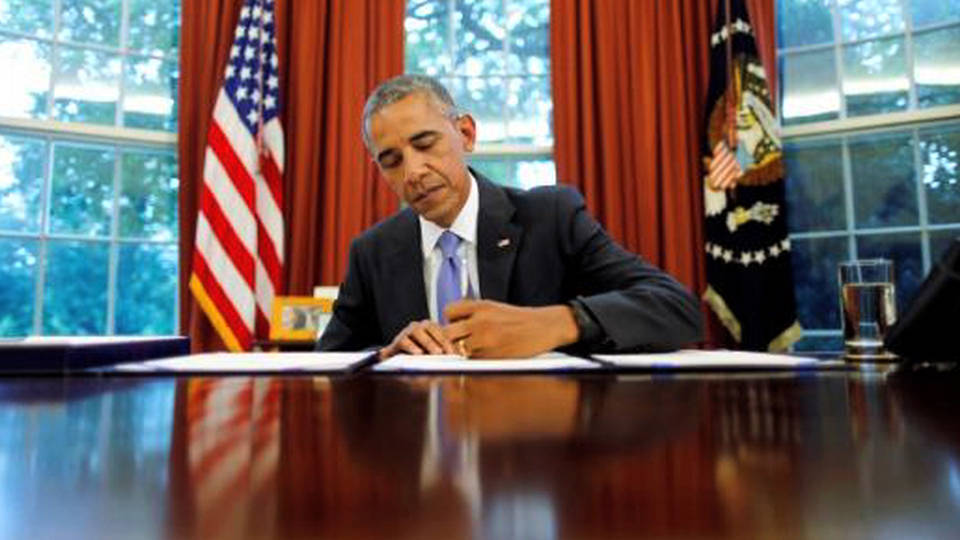
President Barack Obama has signed into law the so-called PROMESA bill, which will establish a federally appointed control board with sweeping powers to run Puerto Rico’s economy.
President Barack Obama: "It’s not, in and of itself, going to be sufficient to solve all the problems that Puerto Rico faces, but it is an important first step on the path of creating more stability, better services and greater prosperity over the long term for the people of Puerto Rico"
While the legislation’s supporters say it will help the island cope with its debt crisis by allowing an orderly restructuring of its $72 billion in bond debt, critics say it is a reversion to old-style colonialism that removes democratic control from the people of Puerto Rico. In Puerto Rico, students, union members, politicians and environmentalists have launched a series of protests against the bill, including marches and an indefinite protest camp outside the U.S. Federal Court in Hato Rey, Puerto Rico.
TOPICS:
Puerto Rico
WSJ: Depopulation of Puerto Rico Contributed to Financial Crisis

This comes as a new Wall Street Journal analysis reveals how Puerto Rico has experienced a severe, decade-long depopulation. A quarter of a million Puerto Ricans have relocated to the mainland United States over the last 10 years, shrinking the labor force by 20 percent. It’s the most dramatic population decline the U.S. Census Bureau has seen since record-keeping began in 1920. Mario Marazzi of the Puerto Rico Institute of Statistics said the scale of the territory’s depopulation is comparable only to the genocide of indigenous Taíno people following the arrival of the Spanish colonists in the 16th century. We’ll host a debate over the PROMESA bill after headlines.
TOPICS:
Puerto Rico
Pentagon to Lift Ban on Transgender People Serving Openly in Military

Defense Secretary Ashton Carter has announced the Pentagon is ending its ban on transgender people serving openly in the U.S. military.
Defense Secretary Ashton Carter: "Our mission is to defend this country, and we don’t want barriers unrelated to a person’s qualification to serve preventing us from recruiting or retaining the soldier, sailor, airman or marine who can best accomplish the mission. We have to have access to 100 percent of America’s population for our all-volunteer force to be able to recruit from among them the most highly qualified and to retain them."
Under the new rules, the military will provide all healthcare, including surgery, to transgender troops. Many hailed the decision as a step forward in LGBT rights. Victoria Rodríguez-Roldán of the National LGBTQ Task Force said, "This decision is a great victory for the many trans people who have served and sacrificed in the military over the years." But others criticized the decision. Award-winning writer Mattilda Bernstein Sycamore wrote, "How far we have come from the original goals of gay liberation as it emerged in the 1960s and 1970s—an end to the oppressive state, organized religion and the nuclear family—a rejection of war, racism, white supremacy and imperialism..." We’ll have more on the Pentagon decision with transgender veteran, Colorado Democratic congressional nominee Misty Plowright later in the broadcast.
TOPICS:
Pentagon
LGBT
Pentagon: U.S. & U.S.-Led Forces Launch 26 Strikes in Syria and Iraq

Meanwhile, the Pentagon has confirmed the U.S. military and U.S.-led coalition forces carried out a total of 26 different airstrikes in Iraq and Syria on Thursday. The Pentagon has not released a death toll. On Wednesday, U.S.-led airstrikes killed as many as 250 people near the Iraqi city of Fallujah.
TOPICS:
Syria
Iraq
North Carolina to Reserve $500,000 to Defend Anti-Trans Law HB 2

North Carolina lawmakers are moving to reserve a half-million dollars for the legal expenses of defending the anti-transgender law HB 2. The Obama administration has sued North Carolina over the law, which nullifies ordinances protecting LGBT people from discrimination and forces transgender people to use the bathroom that matches what they were assigned on their birth certificate.
TOPICS:
North Carolina
LGBT
Judge Blocks Indiana's Anti-Abortion Law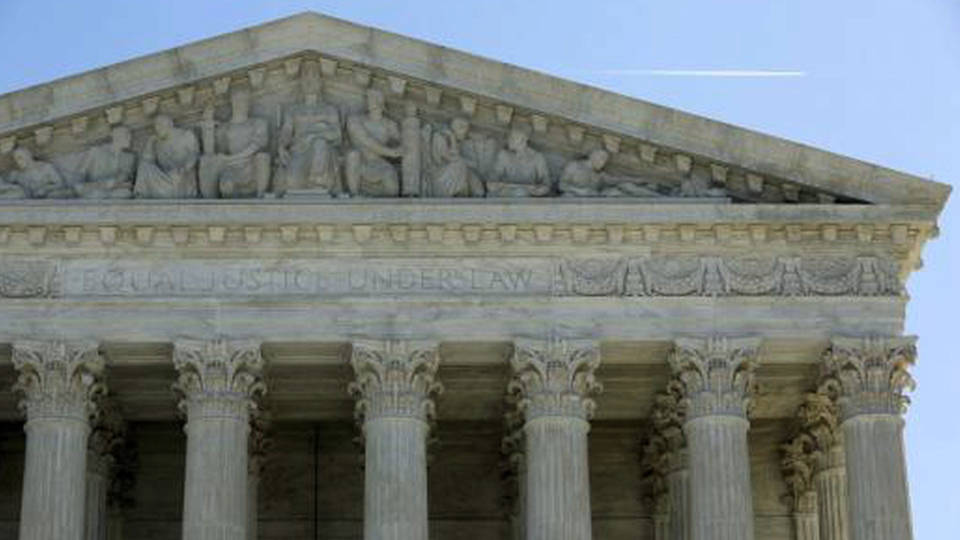
In another victory for reproductive rights, a federal judge has blocked an Indiana law that would have banned abortions based on a fetus’s genetic anomalies or disabilities. The ruling is the latest in a series of decisions upholding women’s right to access abortions, following the Supreme Court’s landmark ruling to strike down Texas’s admitting privileges requirement and another provision requiring abortion clinics to meet the standards of hospital-style surgery centers.
TOPICS:
Abortion
Donald Trump Slams Landmark Supreme Court Abortion Ruling

Meanwhile, Republican presumptive presidential nominee Donald Trump has spoken out about the landmark Supreme Court ruling on abortion, while speaking with conservative radio host Mike Gallagher.
Donald Trump: "Now, if we had Scalia was living or Scalia was replaced by me, you wouldn’t have had that. OK?"
Mike Gallagher "Right."
Donald Trump: "Would have been the opposite."
Mike Gallagher "Right"
Donald Trump: "But, you know, there’s your first example right there of—and that’s going to be the first of many. And if she gets in, if she gets in, it won’t even be—"
Mike Gallagher "It’s going to get worse."
Donald Trump: "You won’t even have to question—you won’t even have to bother going to court. You’re going to know the answers to many of these questions."
Mike Gallagher "You know what will happen before it even gets here. So, just to confirm, under a Donald—a President Donald Trump-appointed Supreme Court, you wouldn’t see a majority ruling like the one we had with the Texas abortion law this week."
Donald Trump: "No, you wouldn’t see that. And people understand that."
In response to Trump’s comments, Dawn Laguens of the Planned Parenthood Action Fund said, "Electing Trump means he will fight to take away the very rights the Supreme Court just ruled this week are constitutional and necessary health care."
TOPICS:
Donald Trump
Abortion
Trump Faces Lawsuit Accusing Him of Raping 13-Year-Old Girl

Meanwhile, Trump is facing questions about a federal lawsuit in which a woman accuses Trump of raping her in 1994 when she was only 13 years old. The lawsuit alleges Trump raped her at a party hosted by billionaire Jeffrey Epstein. Epstein has been jailed on charges of soliciting sex from a minor and has paid out dozens of settlements over allegations of sexual assault at his infamous parties. Donald Trump has denied the allegations in the lawsuit, which was refiled in Manhattan federal court after it was dismissed by a judge in California last month. The suit has largely been ignored by mainstream media or dismissed as "bizarre." But lawyer and author Lisa Bloom writes, "If the Bill Cosby case has taught us anything, it is to not disregard rape cases against famous men." Meanwhile, on Wednesday, the University of Connecticut trustees voted unanimously to revoke Bill Cosby’s honorary degree in light of accusations from more than 50 women that Cosby drugged and raped them, some in cases dating back decades.
TOPICS:
Donald Trump
Sexual Assault
Loretta Lynch Says She'll Accept FBI Guidance in Clinton Email Probe
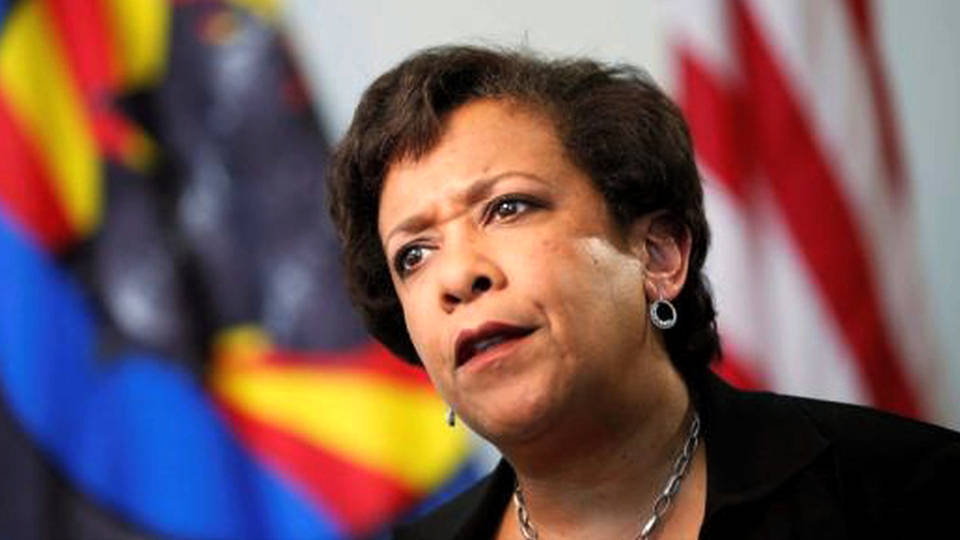
In more news from the campaign trail, a meeting on the tarmac of a Phoenix airport between Attorney General Loretta Lynch and former President Bill Clinton has ignited a political firestorm, with Republicans saying the meeting compromises the Justice Department’s continued investigation into Democratic presidential candidate Hillary Clinton’s use of a private email server while she was secretary of state. Lynch spoke out about the meeting.
Attorney General Loretta Lynch: "I did see the president at the Phoenix airport the other night. As I was landing, he was headed out. He did come over and say hello, and speak to my husband and myself, and talk about his grandchildren and his travels and things like that. So that was the extent of that."
The New York Times reports Lynch is set to announce today that she will accept whatever recommendation prosecutors and the FBI director make about whether to bring charges against Hillary Clinton.
TOPICS:
FBI
Hillary Clinton
CIA Report Admits Agency Had Wrong Man, But Imprisoned Him Anyway
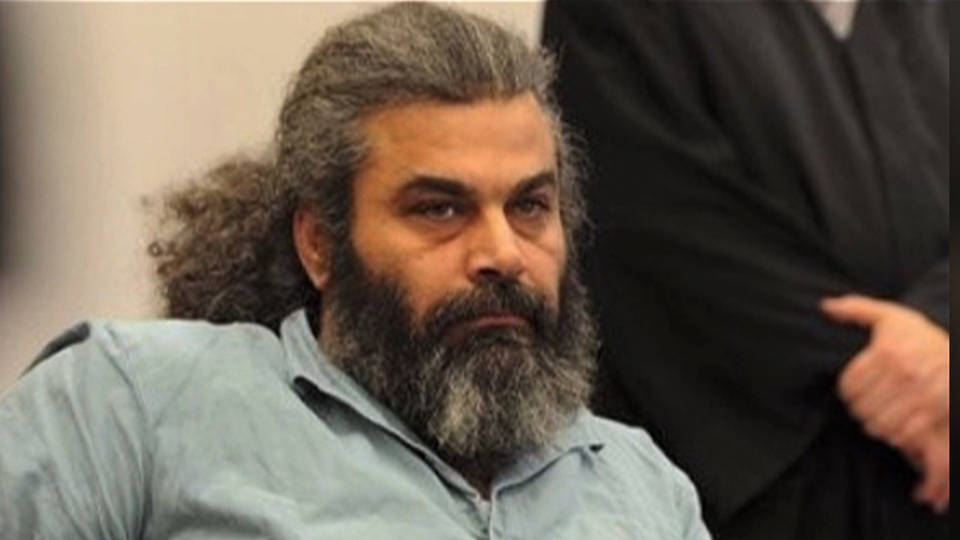
A newly released internal CIA report has revealed how the agency arrested, imprisoned and interrogated German citizen Khalid El-Masri at a secret prison in Afghanistan, even though the CIA knew he was not the man they had been looking for. The report chronicles how the CIA seized El-Masri after Macedonian agents accused him of being a member of al-Qaeda traveling on a false passport. Yet no one from the CIA even looked at El-Masri’s passport for the first three months of his imprisonment, at which point agents determined his passport was real and that there was, as CIA agents wrote, "no basis to justify the continued detention of al-Masri." Yet the agency continued to hold El-Masri for months because it could not decide on an "exit strategy." Finally, CIA agents dumped him in Albania and told him to go home. El-Masri says he was tortured while imprisoned by the CIA. He is seeking an apology from the U.S. government.
TOPICS:
CIA
Lawyer Accuses CIA of Paying Romania to Host Secret Prisons

Meanwhile, a human rights lawyer has accused the CIA of paying Romania millions of dollars to host secret U.S. prisons that were the site of CIA torture programs under the George Bush administration. The allegations were raised during a hearing of the European Court of Human Rights. Romania, a close U.S. ally, has denied the charges.
TOPICS:
CIA
Austria: Court Orders Rerun of Election After Right-Wing Candidate Was Narrowly Defeated

In Austria, the highest court has ordered a rerun of the presidential election, after the far-right candidate Norbert Hofer was narrowly defeated by former Green Party leader Alexander Van der Bellen. Hofer, who won 49.7 percent of the vote, ran on an anti-migrant platform and would have become the first far-right head of state elected in Europe since 1945. The court ruling opens up the possibility he may seize power in the new round of elections.
Cameroon: U.S. Pays Family of Child Killed by Samantha Power Motorcade

In Cameroon, the United States has paid compensation to the family of a 7-year-old boy who was fatally run over by U.N. Ambassador Samantha Power’s motorcade in April. The compensation includes two cows; hundreds of kilos of flour, onions, rice, salt and sugar; and about $1,700. The boy was killed after an armored jeep in Power’s convoy hit him at top speed.
Maryland: Judge Orders Retrial for Adnan Syed

In Maryland, a judge has granted a new trial to Adnan Syed, the subject of the first season of the award-winning podcast "Serial." In 2000, Syed was convicted of murdering his ex-girlfriend, Hae Min Lee. He has long maintained his innocence. His lawyer celebrated the judge’s decision, while Hae Min’s family said, "It remains hard to see so many run to defend someone who committed a horrible crime, who destroyed our family, who refuses to accept responsibility, when so few are willing to speak up for Hae."
Adriano Espaillat Beats Charles Rangel's Successor for Harlem Congressional Seat
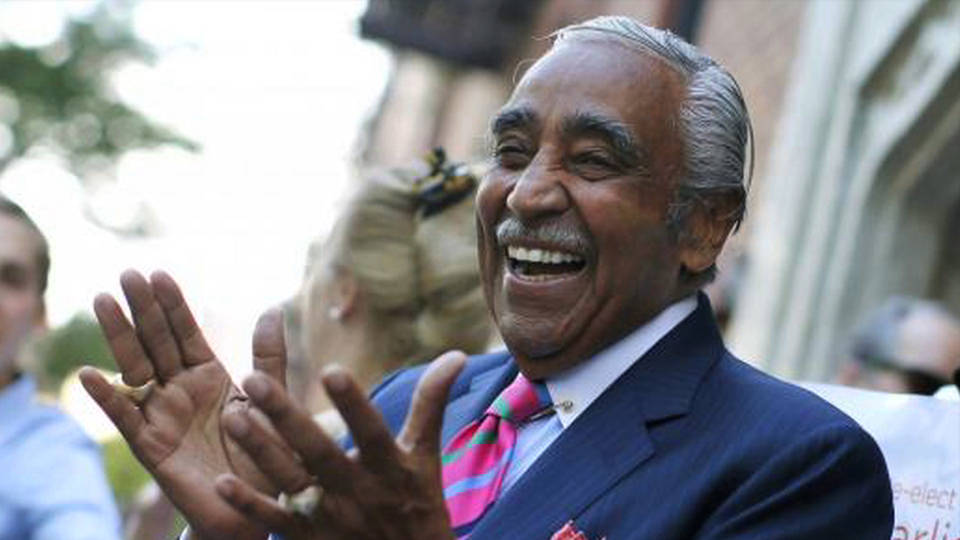
In New York, Assemblymember Keith Wright has conceded to Dominican-born Adriano Espaillat in the U.S. congressional race to succeed longtime Representative Charles Rangel. Rangel is a founding member of the Congressional Black Caucus and has served as Harlem’s congressional representative since 1970. Wright was Rangel’s handpicked successor. This means that for the first time in more than 60 years the congressional seat of Harlem will not be held by an African American.
TOPICS:
New York
Capitol Hill: Tests Show High Levels of Lead in Drinking Water
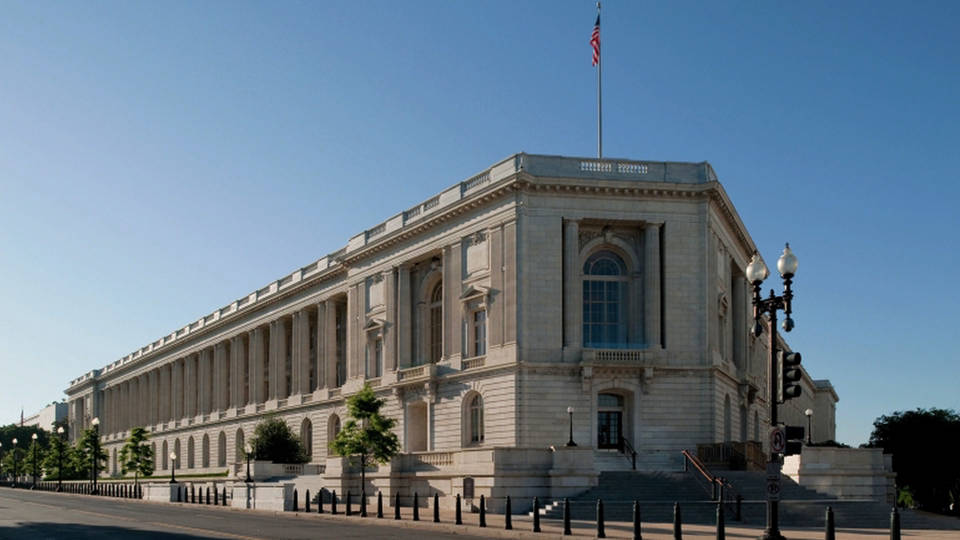
On Capitol Hill, water tests have found high levels of lead in the drinking water in the Cannon Office Building. At least one drinking fountain tested had lead levels three times higher than the EPA safety limit. A USA Today investigation, launched in the wake of the Flint water poisoning crisis, found nearly 2,000 water systems across the United States contained high levels of lead contamination.
TOPICS:
Flint Water Crisis
Water
Vermont: Nation's First GMO Labeling Law Goes into Effect

And in Vermont, the nation’s first mandatory GMO labeling law goes into effect today. Coca-Cola has announced it will likely stop selling some of its products in the state. Multiple companies had sought unsuccessfully to block the law. Farmer and Vermont State Senator David Zuckerman spoke out.
Sen. David Zuckerman: "I’m here today to celebrate our GMOlabeling law, which is going into effect, where consumers are going to have the right to know what’s in their product—straightforward, clear labeling on the packaging: 'This product contains GMOs or may contain GMOs.' I’m standing in front of a field of non-GMO corn here on my farm. But 90 to 95 percent, if not close to 100 percent, of the corn in Vermont is genetically engineered for cattle production. But also, across the country, huge amounts of corn, cotton, soybeans, beets, for sugar, are all grown with genetically engineered ingredients."
TOPICS:
GMO
Vermont
Donate today:
Follow:



SPEAKING EVENTS

President Barack Obama has signed into law the so-called PROMESA bill, which will establish a federally appointed control board with sweeping powers to run Puerto Rico’s economy.
President Barack Obama: "It’s not, in and of itself, going to be sufficient to solve all the problems that Puerto Rico faces, but it is an important first step on the path of creating more stability, better services and greater prosperity over the long term for the people of Puerto Rico"
While the legislation’s supporters say it will help the island cope with its debt crisis by allowing an orderly restructuring of its $72 billion in bond debt, critics say it is a reversion to old-style colonialism that removes democratic control from the people of Puerto Rico. In Puerto Rico, students, union members, politicians and environmentalists have launched a series of protests against the bill, including marches and an indefinite protest camp outside the U.S. Federal Court in Hato Rey, Puerto Rico.
TOPICS:
Puerto Rico
WSJ: Depopulation of Puerto Rico Contributed to Financial Crisis

This comes as a new Wall Street Journal analysis reveals how Puerto Rico has experienced a severe, decade-long depopulation. A quarter of a million Puerto Ricans have relocated to the mainland United States over the last 10 years, shrinking the labor force by 20 percent. It’s the most dramatic population decline the U.S. Census Bureau has seen since record-keeping began in 1920. Mario Marazzi of the Puerto Rico Institute of Statistics said the scale of the territory’s depopulation is comparable only to the genocide of indigenous Taíno people following the arrival of the Spanish colonists in the 16th century. We’ll host a debate over the PROMESA bill after headlines.
TOPICS:
Puerto Rico
Pentagon to Lift Ban on Transgender People Serving Openly in Military

Defense Secretary Ashton Carter has announced the Pentagon is ending its ban on transgender people serving openly in the U.S. military.
Defense Secretary Ashton Carter: "Our mission is to defend this country, and we don’t want barriers unrelated to a person’s qualification to serve preventing us from recruiting or retaining the soldier, sailor, airman or marine who can best accomplish the mission. We have to have access to 100 percent of America’s population for our all-volunteer force to be able to recruit from among them the most highly qualified and to retain them."
Under the new rules, the military will provide all healthcare, including surgery, to transgender troops. Many hailed the decision as a step forward in LGBT rights. Victoria Rodríguez-Roldán of the National LGBTQ Task Force said, "This decision is a great victory for the many trans people who have served and sacrificed in the military over the years." But others criticized the decision. Award-winning writer Mattilda Bernstein Sycamore wrote, "How far we have come from the original goals of gay liberation as it emerged in the 1960s and 1970s—an end to the oppressive state, organized religion and the nuclear family—a rejection of war, racism, white supremacy and imperialism..." We’ll have more on the Pentagon decision with transgender veteran, Colorado Democratic congressional nominee Misty Plowright later in the broadcast.
TOPICS:
Pentagon
LGBT
Pentagon: U.S. & U.S.-Led Forces Launch 26 Strikes in Syria and Iraq

Meanwhile, the Pentagon has confirmed the U.S. military and U.S.-led coalition forces carried out a total of 26 different airstrikes in Iraq and Syria on Thursday. The Pentagon has not released a death toll. On Wednesday, U.S.-led airstrikes killed as many as 250 people near the Iraqi city of Fallujah.
TOPICS:
Syria
Iraq
North Carolina to Reserve $500,000 to Defend Anti-Trans Law HB 2

North Carolina lawmakers are moving to reserve a half-million dollars for the legal expenses of defending the anti-transgender law HB 2. The Obama administration has sued North Carolina over the law, which nullifies ordinances protecting LGBT people from discrimination and forces transgender people to use the bathroom that matches what they were assigned on their birth certificate.
TOPICS:
North Carolina
LGBT
Judge Blocks Indiana's Anti-Abortion Law

In another victory for reproductive rights, a federal judge has blocked an Indiana law that would have banned abortions based on a fetus’s genetic anomalies or disabilities. The ruling is the latest in a series of decisions upholding women’s right to access abortions, following the Supreme Court’s landmark ruling to strike down Texas’s admitting privileges requirement and another provision requiring abortion clinics to meet the standards of hospital-style surgery centers.
TOPICS:
Abortion
Donald Trump Slams Landmark Supreme Court Abortion Ruling

Meanwhile, Republican presumptive presidential nominee Donald Trump has spoken out about the landmark Supreme Court ruling on abortion, while speaking with conservative radio host Mike Gallagher.
Donald Trump: "Now, if we had Scalia was living or Scalia was replaced by me, you wouldn’t have had that. OK?"
Mike Gallagher "Right."
Donald Trump: "Would have been the opposite."
Mike Gallagher "Right"
Donald Trump: "But, you know, there’s your first example right there of—and that’s going to be the first of many. And if she gets in, if she gets in, it won’t even be—"
Mike Gallagher "It’s going to get worse."
Donald Trump: "You won’t even have to question—you won’t even have to bother going to court. You’re going to know the answers to many of these questions."
Mike Gallagher "You know what will happen before it even gets here. So, just to confirm, under a Donald—a President Donald Trump-appointed Supreme Court, you wouldn’t see a majority ruling like the one we had with the Texas abortion law this week."
Donald Trump: "No, you wouldn’t see that. And people understand that."
In response to Trump’s comments, Dawn Laguens of the Planned Parenthood Action Fund said, "Electing Trump means he will fight to take away the very rights the Supreme Court just ruled this week are constitutional and necessary health care."
TOPICS:
Donald Trump
Abortion
Trump Faces Lawsuit Accusing Him of Raping 13-Year-Old Girl

Meanwhile, Trump is facing questions about a federal lawsuit in which a woman accuses Trump of raping her in 1994 when she was only 13 years old. The lawsuit alleges Trump raped her at a party hosted by billionaire Jeffrey Epstein. Epstein has been jailed on charges of soliciting sex from a minor and has paid out dozens of settlements over allegations of sexual assault at his infamous parties. Donald Trump has denied the allegations in the lawsuit, which was refiled in Manhattan federal court after it was dismissed by a judge in California last month. The suit has largely been ignored by mainstream media or dismissed as "bizarre." But lawyer and author Lisa Bloom writes, "If the Bill Cosby case has taught us anything, it is to not disregard rape cases against famous men." Meanwhile, on Wednesday, the University of Connecticut trustees voted unanimously to revoke Bill Cosby’s honorary degree in light of accusations from more than 50 women that Cosby drugged and raped them, some in cases dating back decades.
TOPICS:
Donald Trump
Sexual Assault
Loretta Lynch Says She'll Accept FBI Guidance in Clinton Email Probe

In more news from the campaign trail, a meeting on the tarmac of a Phoenix airport between Attorney General Loretta Lynch and former President Bill Clinton has ignited a political firestorm, with Republicans saying the meeting compromises the Justice Department’s continued investigation into Democratic presidential candidate Hillary Clinton’s use of a private email server while she was secretary of state. Lynch spoke out about the meeting.
Attorney General Loretta Lynch: "I did see the president at the Phoenix airport the other night. As I was landing, he was headed out. He did come over and say hello, and speak to my husband and myself, and talk about his grandchildren and his travels and things like that. So that was the extent of that."
The New York Times reports Lynch is set to announce today that she will accept whatever recommendation prosecutors and the FBI director make about whether to bring charges against Hillary Clinton.
TOPICS:
FBI
Hillary Clinton
CIA Report Admits Agency Had Wrong Man, But Imprisoned Him Anyway

A newly released internal CIA report has revealed how the agency arrested, imprisoned and interrogated German citizen Khalid El-Masri at a secret prison in Afghanistan, even though the CIA knew he was not the man they had been looking for. The report chronicles how the CIA seized El-Masri after Macedonian agents accused him of being a member of al-Qaeda traveling on a false passport. Yet no one from the CIA even looked at El-Masri’s passport for the first three months of his imprisonment, at which point agents determined his passport was real and that there was, as CIA agents wrote, "no basis to justify the continued detention of al-Masri." Yet the agency continued to hold El-Masri for months because it could not decide on an "exit strategy." Finally, CIA agents dumped him in Albania and told him to go home. El-Masri says he was tortured while imprisoned by the CIA. He is seeking an apology from the U.S. government.
TOPICS:
CIA
Lawyer Accuses CIA of Paying Romania to Host Secret Prisons

Meanwhile, a human rights lawyer has accused the CIA of paying Romania millions of dollars to host secret U.S. prisons that were the site of CIA torture programs under the George Bush administration. The allegations were raised during a hearing of the European Court of Human Rights. Romania, a close U.S. ally, has denied the charges.
TOPICS:
CIA
Austria: Court Orders Rerun of Election After Right-Wing Candidate Was Narrowly Defeated

In Austria, the highest court has ordered a rerun of the presidential election, after the far-right candidate Norbert Hofer was narrowly defeated by former Green Party leader Alexander Van der Bellen. Hofer, who won 49.7 percent of the vote, ran on an anti-migrant platform and would have become the first far-right head of state elected in Europe since 1945. The court ruling opens up the possibility he may seize power in the new round of elections.
Cameroon: U.S. Pays Family of Child Killed by Samantha Power Motorcade

In Cameroon, the United States has paid compensation to the family of a 7-year-old boy who was fatally run over by U.N. Ambassador Samantha Power’s motorcade in April. The compensation includes two cows; hundreds of kilos of flour, onions, rice, salt and sugar; and about $1,700. The boy was killed after an armored jeep in Power’s convoy hit him at top speed.
Maryland: Judge Orders Retrial for Adnan Syed

In Maryland, a judge has granted a new trial to Adnan Syed, the subject of the first season of the award-winning podcast "Serial." In 2000, Syed was convicted of murdering his ex-girlfriend, Hae Min Lee. He has long maintained his innocence. His lawyer celebrated the judge’s decision, while Hae Min’s family said, "It remains hard to see so many run to defend someone who committed a horrible crime, who destroyed our family, who refuses to accept responsibility, when so few are willing to speak up for Hae."
Adriano Espaillat Beats Charles Rangel's Successor for Harlem Congressional Seat

In New York, Assemblymember Keith Wright has conceded to Dominican-born Adriano Espaillat in the U.S. congressional race to succeed longtime Representative Charles Rangel. Rangel is a founding member of the Congressional Black Caucus and has served as Harlem’s congressional representative since 1970. Wright was Rangel’s handpicked successor. This means that for the first time in more than 60 years the congressional seat of Harlem will not be held by an African American.
TOPICS:
New York
Capitol Hill: Tests Show High Levels of Lead in Drinking Water

On Capitol Hill, water tests have found high levels of lead in the drinking water in the Cannon Office Building. At least one drinking fountain tested had lead levels three times higher than the EPA safety limit. A USA Today investigation, launched in the wake of the Flint water poisoning crisis, found nearly 2,000 water systems across the United States contained high levels of lead contamination.
TOPICS:
Flint Water Crisis
Water
Vermont: Nation's First GMO Labeling Law Goes into Effect

And in Vermont, the nation’s first mandatory GMO labeling law goes into effect today. Coca-Cola has announced it will likely stop selling some of its products in the state. Multiple companies had sought unsuccessfully to block the law. Farmer and Vermont State Senator David Zuckerman spoke out.
Sen. David Zuckerman: "I’m here today to celebrate our GMOlabeling law, which is going into effect, where consumers are going to have the right to know what’s in their product—straightforward, clear labeling on the packaging: 'This product contains GMOs or may contain GMOs.' I’m standing in front of a field of non-GMO corn here on my farm. But 90 to 95 percent, if not close to 100 percent, of the corn in Vermont is genetically engineered for cattle production. But also, across the country, huge amounts of corn, cotton, soybeans, beets, for sugar, are all grown with genetically engineered ingredients."
TOPICS:
GMO
Vermont
Donate today:
Follow:




SPEAKING EVENTS

Sotomayor "Tells It Like It Is" & Slams Racial Profiling, Illegal Search and Seizure in Scathing Dissent
WORK WITH DN!

The Supreme Court Makes Her story
207 West 25th Street, 11th Floor
New York, New York 10001, United States
---------------------
---------------------



No comments:
Post a Comment